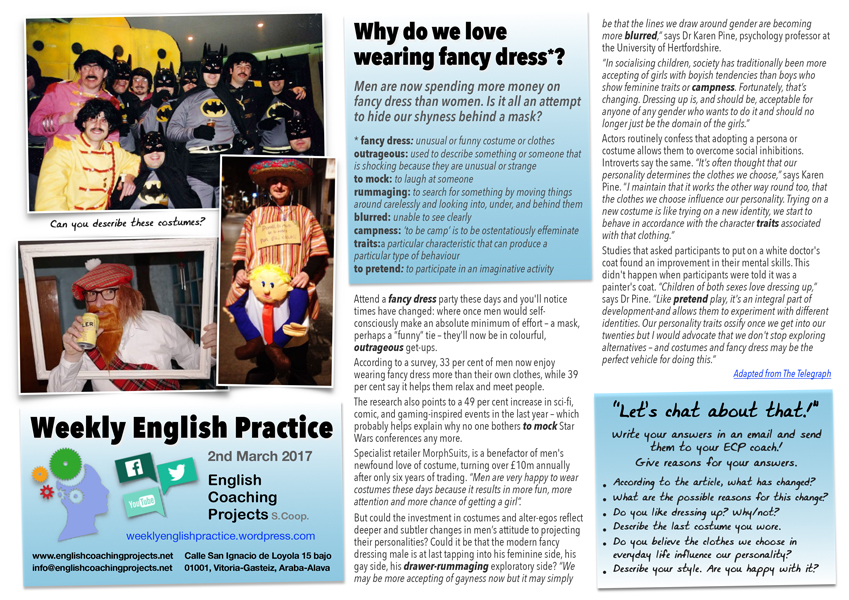Click on the image to download the pdf
* fancy dress: unusual or funny costume or clothes
Men are now spending more money on fancy dress than women. Is it all an attempt to hide our shyness behind a mask?
Vocabulary. Read and check you understand this before you read and listen to the article:
outrageous: used to describe something or someone that is shocking because they are unusual or strange
to mock: to laugh at someone
rummaging: to search for something by moving things around carelessly and looking into, under, and behind them
blurred: unable to see clearly
campness: ‘to be camp’ is to be ostentatiously effeminate
traits:a particular characteristic that can produce a particular type of behaviour
to pretend: to participate in an imaginative activity
Attend a fancy dress party these days and you’ll notice times have changed: where once men would self-consciously make an absolute minimum of effort – a mask, perhaps a “funny” tie – they’ll now be in colourful, outrageous get-ups.
According to a survey, 33 per cent of men now enjoy wearing fancy dress more than their own clothes, while 39 per cent say it helps them relax and meet people.
The research also points to a 49 per cent increase in sci-fi, comic, and gaming-inspired events in the last year – which probably helps explain why no one bothers to mock Star Wars conferences any more.
Specialist retailer MorphSuits, is a benefactor of men’s newfound love of costume, turning over £10m annually after only six years of trading. “Men are very happy to wear costumes these days because it results in more fun, more attention and more chance of getting a girl”.
But could the investment in costumes and alter-egos reflect deeper and subtler changes in men’s attitude to projecting their personalities? Could it be that the modern fancy dressing male is at last tapping into his feminine side, his gay side, his drawer-rummaging exploratory side? “We may be more accepting of gayness now but it may simply be that the lines we draw around gender are becoming more blurred,” says Dr Karen Pine, psychology professor at the University of Hertfordshire.
“In socialising children, society has traditionally been more accepting of girls with boyish tendencies than boys who show feminine traits or campness. Fortunately, that’s changing. Dressing up is, and should be, acceptable for anyone of any gender who wants to do it and should no longer just be the domain of the girls.”
Actors routinely confess that adopting a persona or costume allows them to overcome social inhibitions. Introverts say the same. “It’s often thought that our personality determines the clothes we choose,” says Karen Pine. “I maintain that it works the other way round too, that the clothes we choose influence our personality. Trying on a new costume is like trying on a new identity, we start to behave in accordance with the character traits associated with that clothing.”
Studies that asked participants to put on a white doctor’s coat found an improvement in their mental skills. This didn’t happen when participants were told it was a painter’s coat. “Children of both sexes love dressing up,” says Dr Pine. “Like pretend play, it’s an integral part of development-and allows them to experiment with different identities. Our personality traits ossify once we get into our twenties but I would advocate that we don’t stop exploring alternatives – and costumes and fancy dress may be the perfect vehicle for doing this.”
“Let’s chat about that!”
Write your answers and send them by email to your ECP coach. Why not record your voice too? Listen to yourself speak and identify what you have to improve on 🙂
Give reasons for your answers.
- According to the article, what has changed?
- What are the possible reasons for this change?
- Do you like dressing up? Why/not?
- Describe the last costume you wore.
- Do you believe the clothes we choose in everyday life influence our personality?
- Describe your style. Are you happy with it?


